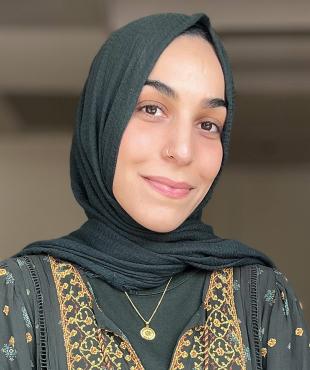
Walaa Jumma
Financial Analyst Pursues Social Justice to Reimagine Structures of Refuge
When Walaa Jumma, AM ’22, decided to make a career change from finance, she applied to 10 graduate programs in social work. Jumma doubted that she could get into the University of Chicago Crown School of Social Work, Policy, and Practice, but she applied anyway.
“It’s one of the top competitive programs in the country, but a good friend told me, ‘shoot your shot,’ so I did,” said Jumma, who became a social administration concentration student in the Global Social Development Practice Program (GSDP).
Her friend gave great advice. Jumma’s qualifications and merit earned her a spot at the Crown Family School and a highly competitive Islamic Scholarship Fund Cohort Award in 2020. Additionally at UChicago, she was selected as a Crown Scholar, Dean Distinguished Leader, and Graduate Global Impact Intern.
“Jessica Darrow is the reason I chose to come to the University of Chicago,” Jumma said of the director of the Crown Family School’s GSDP Program. “I was inspired by her research critiquing the harm refugee resettlement policy can cause newcomers in our communities, because I've navigated the other side of it.”
Jumma continues to value the mentorship that Darrow continues to provide. Darrow, meanwhile, credits Jumma for making her a better teacher.
“I learned a lot from having shared the classroom space with Walaa, someone who has freshly experienced so much of the context I teach about,” said Darrow, AM ’07, PhD ’14.
Jumma’s parents fled Iraq after the Shi'a uprising of 1991, a response to Saddam Hussein’s savage oppression of the Shi'ite and the Kurdish people. Jumma, and her family spent years trapped on the borders of Iraq and Saudi Arabia, awaiting safety, before being selected for resettlement in Michigan.
The years of hardships that Jumma and her family had endured motivated her to seek the financial security that a business degree from Wayne State University could help provide.
Still, she nurtured an overarching dream of using her management skills to one day open a community center for refugee communities. As she built a successful career in finance, her dream persisted.
“I had a moment where I turned around and wondered why the rest of my refugee community was stuck in the same position and why I was one of the few to get out. That is when I started to reimagine how refuge can take shape,” she said
In her second-year field placement with the U.S. Commission on Civil Rights, Jumma planned and conducted three public hearings in the State of Pennsylvania on fair housing and the discriminatory impact of zoning practices on the black, and immigrant communities
“Seeing how one person, an intern, can have a say in directing, organizing, and framing a public hearing that impacts the whole State of Pennsylvania was eye-opening,” she said.
While in her second year at the Crown Family School, Jumma received a contract from the U.S. Conference of Catholic Bishops to launch an emergency English Education Curriculum at Fort Dix in New Jersey for humanitarian parolees after U.S. troops withdrew from Afghanistan. During her time, she organized and successfully help launch the English Conversation Program, while also teaching classes in the village park with students.
“It just never would have happened if I did not have a background in project management or in operations or finance. I was able to use tools like forecast modeling to build class projections,” she said.
After graduation, Jumma became a director for AsylumWorks in Washington, D.C.. There again, she has found that her business skills readily transferred. And now she is restructuring the community development and engagement program, that serves asylum seekers.
Jumma credited the Crown Family School for equipping her with the academic frameworks and theories that allowed her to critically reflect on linkages between societal processes and trauma that she needs to understand as a social worker.
“Through my background, I learned how to map, how to connect dots, and how to spot the gaps” Jumma said. In the business world, she looked at a company’s financial health. In social work, she put the same focus on a person’s holistic health.
“As a social worker, it’s easy to get stuck harping on what’s not working. But if you can strategically come up with solutions from a pragmatic and critical lens, you immediately become persuasive in the room to your audience,” she said.
No wonder, then, that Darrow assesses Jumma as an outstanding social worker.
“Her internal guide is so strong, her commitment to social justice is so much a part of who she is that the joy for me in working with Walaa was helping her figure out where she wanted to direct that light,” Darrow said.
“We were able to support her in learning some specific skills and tools. But what makes her such an incredible social worker is a guiding light within her that we didn’t give her.”